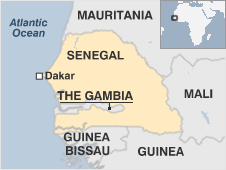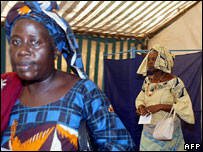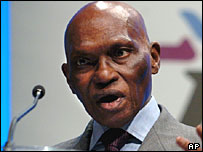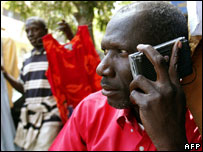 |
Although poverty is widespread and unemployment is high, the country has one of the region's more stable economies.
Overview
For the Senegalese, political participation and peaceful leadership changes are not new. Even as a colony Senegal had representatives in the French parliament. And the promoter of African culture, Leopold Senghor, who became president at independence in 1960, voluntarily handed over power to Abdou Diouf in 1980.
|
|
AT-A-GLANCE

Politics: Abdoulaye Wade came to
power in 2000, ending four decades of
Socialist Party rule; he won a second term
in February 2007
Economy: Agriculture drives the
economy; tourism is a source of foreign
exchange
International: Senegal has mediated
between Sudan and Chad over Darfur
tensions; many African illegal migrants
use Senegal as a departure point for
Europe
Security: Despite a peace deal, a
low-level separatist rebellion simmers in
Casamance, in the south
|
The 40-year rule of Senegal's Socialist Party came to a peaceful end in elections in 2000, which were hailed as a rare democratic power transfer on a continent plagued by coups, conflict and election fraud.
Senegal is on the western-most part of the bulge of Africa and includes desert in the north and a moist, tropical south. Slaves, ivory and gold were exported from the coast during the 17th and 18th centuries and now the economy is based mainly on agriculture. The money sent home by Senegalese living abroad is a key source of revenue.
A long-running, low-level separatist war in the southern Casamance region has claimed hundreds of lives. The conflict broke out over claims by the region's people that they were being marginalised by the Wolof, Senegal's main ethnic group.
The government and rebels signed a peace pact at the end of 2004, raising hopes for reconciliation.
On the world stage, Senegal has sent peacekeeping troops to DR Congo, Liberia and Kosovo.
Facts
- Full name: Republic of Senegal
- Population: 12.5 million (UN, 2009)
- Capital: Dakar
- Area: 196,722 sq km (75,955 sq miles)
- Major language: French (official), Wolof
- Major religion: Islam
- Life expectancy: 54 years (men), 57 years (women) (UN)
- Monetary unit: 1 CFA (Communaute Financiere Africaine) franc = 100 centimes
- Main exports: Fish, peanuts, petroleum products, phosphates, cotton
- GNI per capita: US $970 (World Bank, 2008)
- Internet domain: .sn
- International dialling code: +221
Leaders
President: Abdoulaye Wade
Abdoulaye Wade, the founder of the Senegalese Democratic Party, won re-election in February 2007, gaining nearly 56% of the votes cast - enough to avoid a second-round ballot.

President
Abdoulaye Wade, an advocate of democracy
in Africa
|
After election officials confirmed his win, Mr Wade warned that corruption cases involving his opponents would be re-opened. The opposition Socialist Party said it would challenge the result.
Mr Wade came to power in March 2000, winning presidential elections at the fifth attempt and defeating Abdou Diouf's Socialist Party. He was 73 at the time.
He found himself in a political impasse: The presidential poll did not coincide with parliamentary elections and he was left heading a minority coalition.
But elections in April 2001 consolidated his power base. His supporters gained control of the national assembly, with his party winning 89 of the 120 seats.
An advocate of democratisation, Mr Wade helped to launch the New Partnership for Africa's Development, or Nepad. The plan aims to foster economic recovery through African-led reforms and good governance. He has sought to strengthen ties with the US.
His critics say he has failed to deliver on promises to boost living standards.
Abdoulaye Wade was born in northern Senegal in 1927. He studied in France and has a French wife.
Senegal has a lively political scene, with parties competing across ethnic, religious and ideological lines.
Media
Senegal has traditionally enjoyed one of the most unrestricted press climates in the region.
But in summer 2008, amid rising tension between the government and private media, Paris-based Reporters Without Borders expressed concern about "police violence" against journalists, and about raids on newspaper offices. The government accused journalists of supporting the opposition.

Radio is an
influential medium
|
The constitution guarantees media freedom. The government does not practise censorship, but self-censorship arises from laws which prohibit reports that discredit the state, incite disorder or disseminate "false news". Nevertheless, the private media frequently criticise the government.
Radio is an influential medium. Commercial and community stations have mushroomed since the 1990s.
There are nearly 20 daily newspapers. Foreign publications circulate freely and multichannel pay TV is readily available. BBC World Service (105.6 MHz) and Radio France Internationale are available on FM in Dakar.
The press
- Le Soleil - state-owned daily
- Sud Quotidien - private daily
- Le Quotidien - private daily
- L'Observateur - private daily
- Wal Fadjri L'Aurore - private daily
Television
- Radiodiffusion Television Senegalaise (RTS) - state-run national broadcaster, operates RTS1 and RTS2
Radio
- Radiodiffusion Television Senegalaise (RTS) - state-run national broadcaster, operates Chaine Nationale and Chaine Internationale networks, the capital's Dakar FM, and several regional services
- Sud FM - private, available in Dakar and other cities
- Nostalgie - Dakar-based private station
- Sept FM - private, Dakar station operated by Groupe Com 7
- Walf FM - private, operated by Groupe Wal Fadjri
- Radio Dunyaa - private
- Radio Future Medias (RFM) - private
News agency
-
Agence de Presse Senegalaise - state-run
AFRICA | ASIA-PACIFIC | AMERICAS | EUROPE | MIDDLEEAST | SOUTHASIA
Mauritania Mauritius Morocco Mozambique Namibia Niger Nigeria Republic-of-congo Rwanda Sao-tome-and-principe Senegal Seychelles Sierra-leone Somalia South-africa Sudan Swaziland Tanzania The-gambia Togo Tunisia Uganda zambia Zimbabwe Australia Brunei Burma Cambodia China East-timor Fiji Indonesia Japan Kazakhstan Kiribati Kyrgyzstan Laos Malaysia Marshall-islands Micronesia Mongolia Nauru New-zealand North-korea Palau Papua-new-guinea Samoa Singapore Solomon-islands South-korea Taiwan Tajikistan Thailand The-philippines Tonga Turkmenistan Tuvalu Uzbekistan Vanuatu Vietnam Antigua-and-barbuda Argentina Bahamas Barbados Belize Bolivia Brazil Canada Chile Colombia Costa-rica Cuba Dominica Dominican-republic Ecuador El-salvador Grenada Guatemala GuyanaHaiti Honduras Jamaica Mexico Nicaragua Panama Paraguay Peru St-kitts-and-nevis St-lucia St-vincent-and-the-grenadines Suriname Trinidad-and-tobago United-states-of-america Uruguay Venezuela Albania Andorra Armenia Austria Azerbaijan Belarus Belgium Bosnia-hercegovina Bulgaria Croatia Cyprus Czech-republic Denmark Estonia Finland France Georgia Germany Greece Hungary Iceland Ireland Italy Latvia Liechtenstein Lithuania Luxembourg Macedonia Malta Moldova Monaco Montenegro Norway Poland Portugal Russia San-marino Serbia Slovakia Slovenia Spain Sweden Switzerland The-netherlands Turkey Ukraine United-kingdom Vatican Algeria Egypt Iran Iraq Israel-and-palestinian-territories Jordan Kuwait Lebanon Libya Mauritania Oman Saudi-arabia Sudan Syria Tunisia United-arab-emirates Yemen Afghanistan Bangladesh Bhutan India Nepal Pakistan Sri-Lanka The-Maldives

